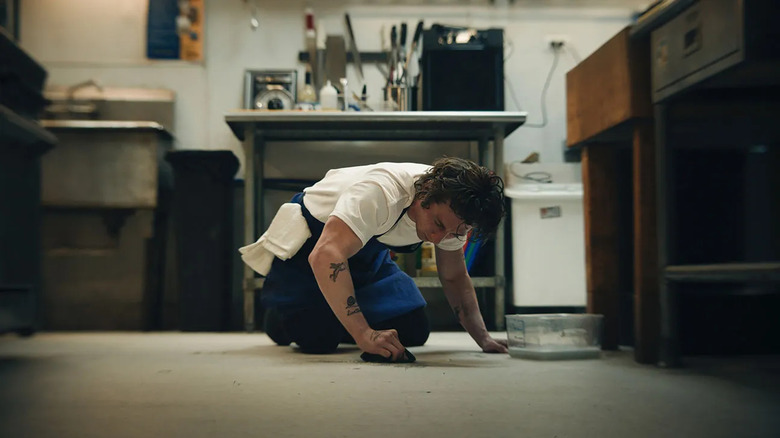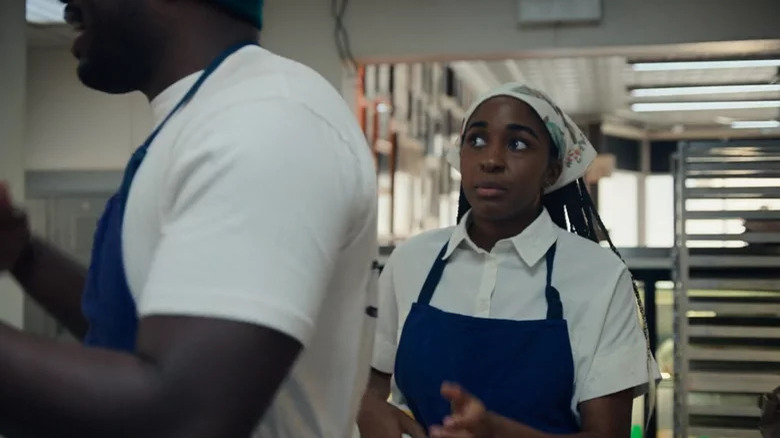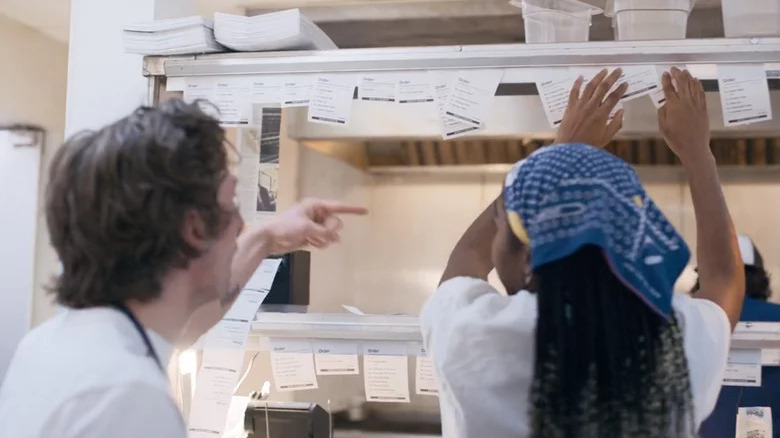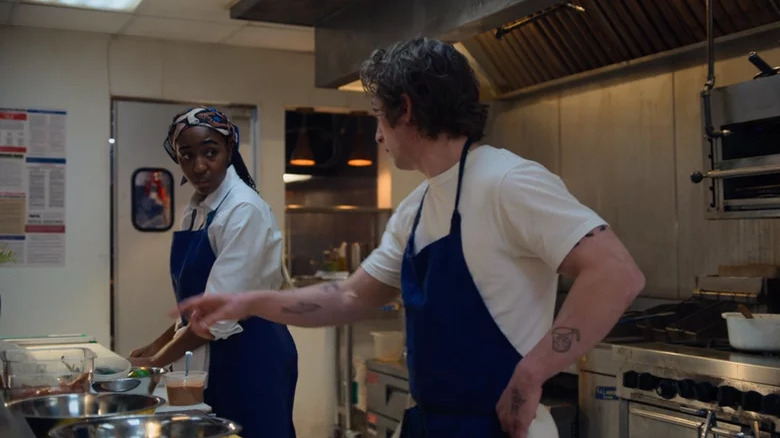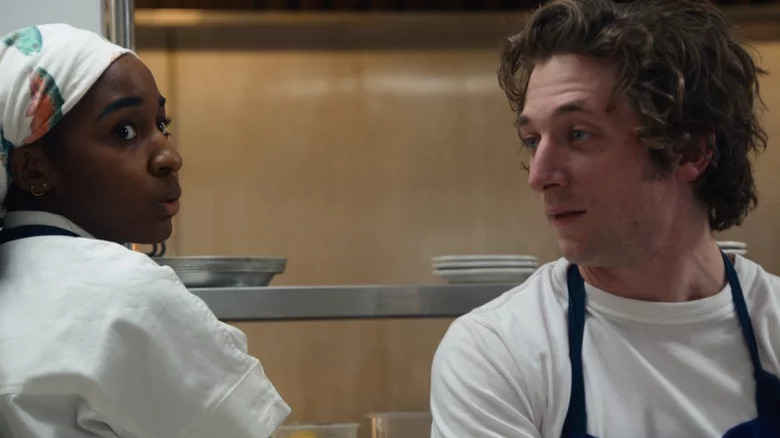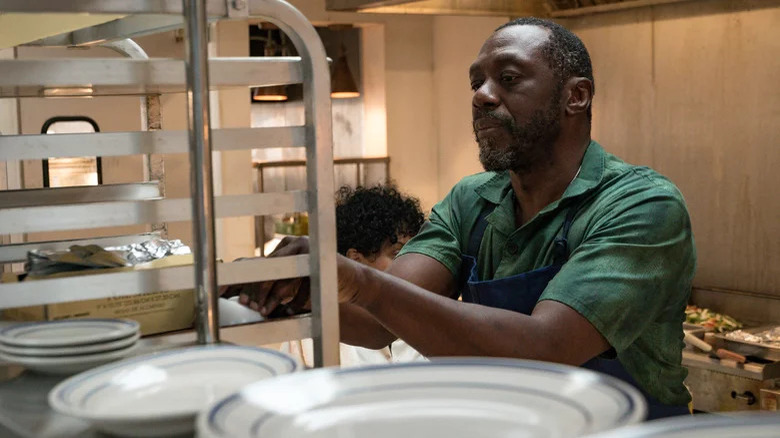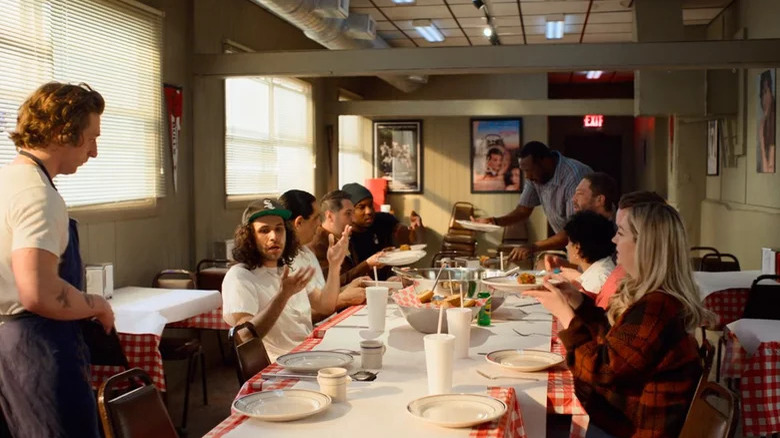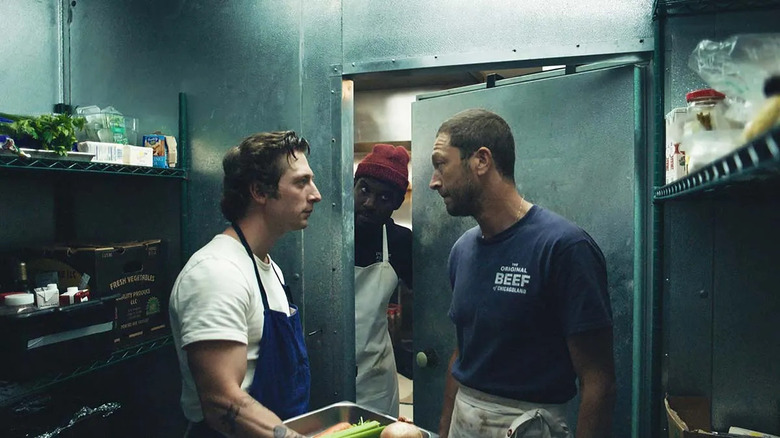The Bear's Kitchen Lingo, Explained
One of the things that sticks with you the longest after working in kitchens — besides the burns scars — are the sounds. The clicking of a gas stove trying to catch, the screechy crunch of orders printing on tickets, the clanging and banging of pots and pans, and the constant din of swearing and shouting. Everyone who's worked in a kitchen has the sound that occasionally wakes them up in a cold sweat — for me it's an actual call bell, like you'd see on a hotel lobby desk. Several places I worked at used those to let servers know an order was ready to go out to a table, instead of yelling for "hands!" like many other places.
The FX series "The Bear" is the most accurate depiction of what it's like working in a kitchen that I've ever seen, and a huge part of that is the sound. Granted, the show isn't particularly accurate when it comes to its Chicago setting, but the ins and outs of working in food service are all too real, including the dialogue. Food service has a whole vocabulary of terms that might make "The Bear" a little confusing for non-service industry folks, but I've put together a handy-dandy guide to all of the lingo Carmy (Jeremy Allen White) and the rest of the gang use in the kitchen. So don't worry if you don't know your "86's" from your "chits," because this guide will explain it all, from the family dinners of season 1 to the chaos menu of season 2 and more!
Watch where you're going
Two terms that every person in a restaurant learns very quickly are corner and behind, because if you don't, you're going to end up with hot food all over you. There are lots of blind corners in restaurant kitchens, where everything is packed in as tightly as possible and rows of cooking equipment face off against shelves and the serving window. It's very easy to come around a corner with a tray full of plates or a huge pot of boiling water and slam into someone else coming around the same corner, which is why servers, cooks, and all other staff learn to yell "corner!" before going around any corner in the back of house. (Back of house is what the kitchen/dish pit are usually called, and all staff who work back there are collected under this term as well, whereas front of house is where the customers order, are served, and eat, and staff who work up front are categorized this way.)
Similarly, staff yell "behind!" when they are directly behind someone, usually if they're carrying something. That way the person in front knows not to stop too quickly, or else they might end up with a back full of chicken soup or dishwater. Kitchens are pretty narrow, too, so it can also mean "move out of the way!" These are basic safety measures, but they're extremely important in a kitchen because everyone's moving fast and it's not always easy to see.
A sense of urgency
On top of dealing with the fact that it's hard to see much in a kitchen, there's also a constant sense of urgency. People expect their food to come up hot and quick, and that desire translates to a whole lot of running around in the kitchen. In order to help things move faster and everyone communicate quickly, kitchens have developed shorthand over the years to help give instructions, and if you're ever in doubt, just check the chit (A.K.A. the order ticket). Perhaps the most important is hands, which gets yelled quite a bit in the series and is the name of the second episode. When someone shouts "hands" in a kitchen, it means they need someone there to hold or carry something immediately. Usually it means that they need a server or food runner to come and take a hot order out to a table, but in "The Bear," the back of house staff also do all of the front of house work. That means anytime they hear a call for hands, they had better be ready to run and help unless they're way too busy, or in the weeds. When someone is in the weeds they are so overwhelmed with work that they cannot stop to do anything else.
The other urgent order in a kitchen is fire, and it doesn't mean what you might think. The term is almost always followed by a food order, and to "fire" it means to make it immediately. It's the same as saying "I need you to make," just shortened to a single word and given that needed sense of urgency. So when Carmen asks someone to fire two sandwiches, he just means to make them pronto. And a refire? Make it over, fast!
What's on the menu
Season 2 introduced audiences to the chaos menu, which is the idea of a menu that doesn't follow a particular style of cuisine, mixing food from different regions to create a fusion of flavors. That's quite a bit different from The Beef's menu in season 1, which consisted mostly of sandwiches and Italian classics. Instead of prepping a whole day's worth of sandwiches in the morning, things get a little more complicated. That means sometimes the restaurant will run out of what's needed to make more of a particular entree, which means they simply can't make any more. So if Sydney (Ayo Edebiri) says she has 26 beef short ribs all day, then the 27th customer who orders them is going to be out of luck.
When that happens, and the restaurant runs out of something, that item is 86'd. I worked at one place that had chicken pot pie as a specialty, and the words "86 pot pie" are burned into my memory as surely as the lyrics to "Jingle Bells." Many kitchens have a white board somewhere with the all day totals and 86'd items written on them so that anyone who missed the call-out still gets the message, but someone also usually goes around the place making sure everyone knows what was 86'd. After all, the last thing you want to do is take an order for something you don't have. Customers really don't like that.
Respect and understanding
All of this shorthand exists to help kitchen workers communicate clearly, but part of it is also about showing respect. Tensions can run hotter than the burner in kitchens, so short, simple answers are often the best. Throughout the season, any time someone listens and understands something completely, they reply with "heard." This also usually means that they're going to do whatever was just asked of them, because heard means understood. The other major reply we hear in the kitchen is "yes, chef," which sounds more formal but is a little less genuine. While it means exactly what it sounds like and is a reply of confirmation, it also has a tendency to be used with a bit of attitude. I've heard plenty of "yes, chef" responses in my life that were absolutely dripping with irritation, but because the title of chef is still attached, the person is still showing deference to the hierarchy of the kitchen. That hierarchy is a very delicate balance, so maintaining egos by biting your tongue and using the kitchen equivalent of "yes, sir" can often be the smartest move.
By the end of season 2, however, everyone starts calling one another chef, showing equality and respect that's really impressive. Carmen also teaches the crew the gesture for "I'm sorry" in American Sign Language, which becomes another shorthand that they all use to quickly communicate when things get stressful.
The system
Every kitchen is a little bit different, but they all follow some kind of system that ensures everyone knows what to do and the jobs flow together smoothly. For hundreds of years, restaurants have used the Escoffier-style French brigade, referred to in "The Bear" mostly as the brigade, and this hierarchy system helps determine which chefs do which part of the cooking. While many high-end restaurants use the system, most of your local joints use a modified version that reduces or removes some of the roles entirely. Other restaurants have their own systems, and Carmen discovers that his brother Mike (Jon Bernthal) had his own system in place that doesn't quite work. Sydney suggests instituting the brigade, assigning specific roles to each of the chefs that they were already sort of filling anyway. For example, Marcus (Lionel Boyce), who has been baking the entire time, becomes the boulanger, which just means "baker," but the title also has its own rank in the system, and determines who he reports to and who he can make decisions over. It's a lot like the military, but for feeding people.
If you're not a part of the brigade and you're just shadowing to learn, that's called staging, pronounced stahj-ing. In season 2, there's even an entire episode around Richie (Ebon Moss-Bachrach) learning the ins and outs of the business through staging, while Marcus learns from a baker in Copenhagen. Sometimes it's also called trailing, and depending on where you live it's often an unpaid intern kind of gig, where you are compensated for your time with meals instead of money. At least that food has to be really good, right?
Even chefs have to eat
Speaking of feeding the employees, "The Bear" has family meal, which is something that many restaurants do for their staff to ensure that everyone gets fed before their long and often hunger-inducing dinner shift. In "The Bear," the chefs take turns with family meal each day, cooking a giant dish for everyone to share. Again, every restaurant does this differently: I've worked at places where you were simply expected to have eaten before coming in, while other places made extras of the special each night for the staff to all eat so the front of house folks could sell the dish with enthusiasm. Family meal is also often a time for the folks at the top of the chain to go over the plan for the evening, let everyone know about any special events or concerns, and get a feel for how the shift might go.
While watching "The Bear," you might notice that Carmen really doesn't eat much, often declining family meal and scarfing down a peanut butter and jelly sandwich with some chips and a soda after a long shift, and that's honestly pretty accurate. The insane stress of the kitchen can do a number on your stomach (there's a reason that most of the characters in "The Bear" are on some kind of anti-anxiety medication) and often chefs only pick at bits of food here and there to taste-test but otherwise don't eat for long stretches. Add in the fact that many chefs smoke cigarettes — tobacco is an appetite suppressant — and that's how you get skinny chefs like Carmy right alongside your beefier boys like real-life chef Matty Matheson, who plays family handyman Neil Fak.
This and that
There are a few other fun additions to the restaurant-industry lingo in season 2, like when Sydney and Tina (Liza Colón-Zayas) use Barkeepers Friend to clean some old pots that have been left to rust. That stuff will clean just about anything, especially old metal pots and pans, especially with a little steel wool. Another is Friends and Family, which is when a new restaurant tests how things will go by soft opening and inviting family and friends of the staff. It's stressful opening a new place, but when your stress test is done with friends and family as guests instead of strangers who can quickly become irate customers, it's a whole lot easier going. Even then, Friends and Family ends up being a wild ride for the crew of The Bear when Carmy gets stuck in the walk-in and Sydney and Richie must step up and take over.
Watching "The Bear" is always entertaining, even if it is often as stressful as living the life of a restaurant worker. All that I know is I'm glad to be a writer now instead.
